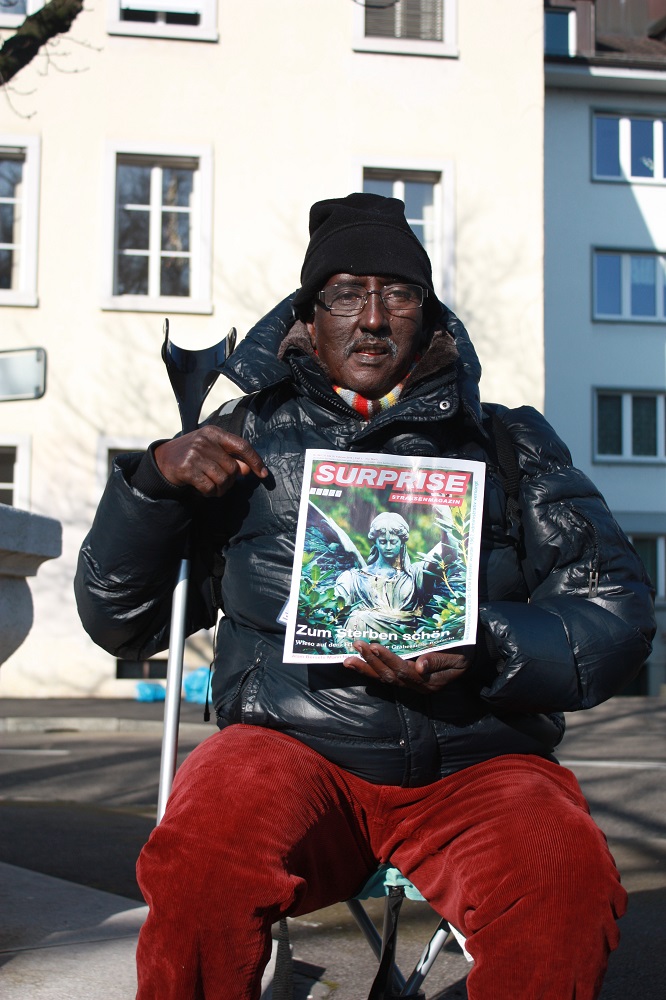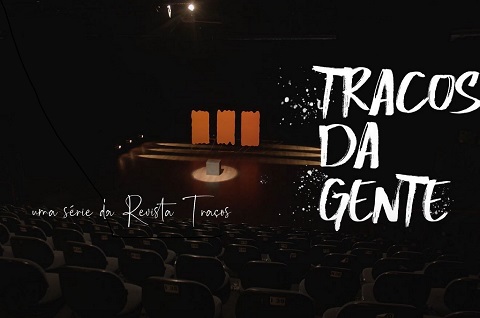By Beat Camenzind, Surprise
Ali Nur Mohammed is a Surprise vendor in Allschwil, Basel. The 60-year-old Somali national previously worked as a veterinarian but can no longer take part in this type of work. The main reason is the serious injury he received in an Al-Shabaab terrorist attack. Mohammed was the only survivor of the attack and survived because he pretended to be dead. Since the attack, he has worn a prosthetic right leg.
At times, Ali Nur Mohammed simply despairs. His leg hurts and his 30-year career – during which he took part in many projects, including those carried out with the Swiss aid organisation Veterinarians Without Borders – is now irrelevant. But he hasn’t lost his sense of humour and still has hope. An article about him in Surprise magazine made it to the USA and was spotted by the Veterinary Information Network (VIN). The doctors decided to help their colleague and set up a foundation in order to help him. With the money raised, they hoped to buy him a new prosthetic limb to replace his unwieldy, 15kg prosthesis which causes him pain. By the end of the following year, they had reached the $25,000 goal.
Ronnie Schenkein laughs a lot. The 61-year-old ran a practice in Pennsylvania, USA until she was forced to retire last year after contracting Lyme disease and suffering from memory loss. She has since turned her focus to new tasks – namely the VIN and the Ali Nur Mohammed Foundation. Her decision to get involved with the foundation is another story. Her grandfather was the only one of his 13 siblings known to have survived the Second World War: because of the war and the Iron Curtain, he lost track of his siblings and never found out what happened to them. Later, her mother contracted an illness that left her unable to move. However, her mind remained as sharp as ever. These experiences taught Schenkein a lesson: fate can make or break a person. She believes that Ali Nur Mohammed is someone with an extraordinary desire to make the most of his life.
Ronnie Schenkein recently attended a conference in England and decided to visit Mohammed in Basel while she was in Europe. We were with them when they met.

Surprise: When did you first hear about each other?
Schenkein: The Veterinary Information Network has a news site and I read an article that they published about Ali. I contacted him and he was happy to get in touch with other vets.
Mohammed: The Veterinary Association read about me in an article by Surprise and a journalist from the VIN contacted me. This is how Ronnie heard about me and we’ve been writing to each other ever since. Now she is here and has become a part of my family!
Could you still work as a veterinarian?
Mohammed: I was a vet in Somalia from 1982-2010. Here in Switzerland I sorted out the paperwork and got a B permit. But I can’t do any strenuous work because of my prosthetic limb. As a vet you need to be strong, particularly with larger animals.
Schenkein: I’m trying to find a job for Ali. He has a lot of experience with animals in Africa and I think it’s a shame for all of his knowledge to go to waste. Ali also knows a lot about the administrative procedures in aid programmes and how to implement them. This is something he could also do here. He speaks good English, tells good stories and can raise awareness of the situation in Somalia. But to do that here he has to improve his German: he can already speak Somali, Italian, Arabic and English.
You speak Italian?
Mohammed: Tu parli l’italiano? Non credo che tu parli l’italiano.
Ma sì, un po!
Mohammed: La lingua tedesca è molto difficile.
Molto?
Mohammed: Sì. E difficile da imparare.
You laugh a lot. Did this change after the attack?
Mohammed: No, it’s always been like this.
Does laughing help?
Mohammed: Yes, I laugh a lot.
Does it also help you deal with the prosthetic limb?
Mohammed: Yes, but sometimes it hurts a lot at night when I move around. My right leg ends mid-thigh, but I still feel pain where my foot should be. They call this phantom pain.
Schenkein: A neuroscientist came up with a therapy to help with phantom pain. It involves patients looking in a mirror in an attempt to trick your brain. They think that their arm is still there because everything is back-to-front in a mirror. If you can’t see your arm because it’s twisted round the back of your body, then you would bring it back to the front. When the patient sees this, then the phantom pain goes away.
Mohammed: I also tried this, but it didn’t help with the pain. There’s a problem with the nerve.
Ronnie Schenkein, you said that you are so supportive of Ali Nur Mohammed because of your own experience. But is there another reason, too?
Schenkein: One of the most important things in life is to view things from other people’s point of view. As soon as I know the other person’s story, I simply can’t judge them. If everyone did this, then there wouldn’t be any war in the world.
Why doesn’t everyone think like this?
Schenkein: Some animals have a different outlook than people. Dogs make sense of the world with their nose. If you know this, then you can have a better understanding of dogs. This goes for everyone; if you want to understand other people, you have to try to understand their way of thinking. I don’t understand why nobody does this. Some people kill each other if they don’t have enough to eat or drink (but not in every case). Some people who share their food even though they barely had enough for themselves. Others live in a world where they think that if they don’t look out for themselves and for their needs then they’ll never get what they need or want. So they have to be tough. Is this how the world’s problems could be solved?
Ronnie, as a vet, you have to understand animals. How do you do this?
Schenkein: it takes a lot of knowledge, communication and passion – and you have to be smart. Over time, you learn what will scare an animal. With cats, you should close your eyes so they don’t get scared. You should approach horses from the side, pigs like to be stroked and you should lift dogs up from underneath. These are all things that you learn with time. Ali told me how amazing it is to work with camels.
As a vet, how do you befriend a camel?
Mohammed: Camels are an important animal in Somalia. They provide milk, are a means of transport and can also act as a surveillance or ‘guard’ animal. The milk contains less fat than cows’ milk, contains phosphorus and calcium and has a month-long use-by date. Camels drink milk until they are three years old and then you have to start getting them used to people – which takes a lot of training. As soon as the camel has learned to accept commands and orders from people, they can be around children. They bend their legs in a way that allows people to get on their back or milk them. Camels will obey everyone – unlike dogs, who will only listen to their owner. In spring, you have to be careful around the male camels because this is the mating period – pheromone levels are high and they are nervous. Some males fight – sometimes killing each other – or attack people.
Are camels still used as a payment?
Mohammed: Years ago, if a man wanted to propose to a woman, he would have to pay 50 camels. Nowadays, a man will only pay 2 to 5 camels for a woman, and some pay with cows. Cows and goats aren’t as valuable as camels. If someone kills another person, they must pay ‘blood money’ in the form of 100 camels. This should be paid to the clan of the person that you killed.
You have treated many camels. Do you like this type of work?
Mohammed: As a vet you have to convince an animal to let you treat them. It’s not always easy – some animals want revenge because their pain was caused by humans.
Translated from German by Kirsty Smith




















